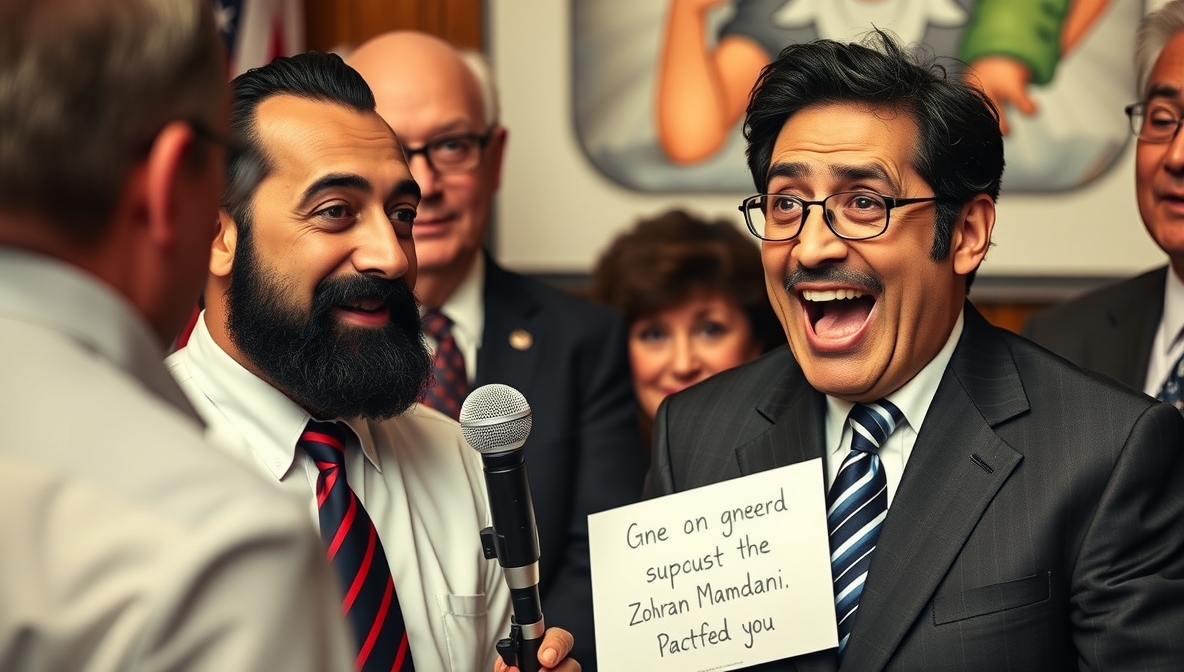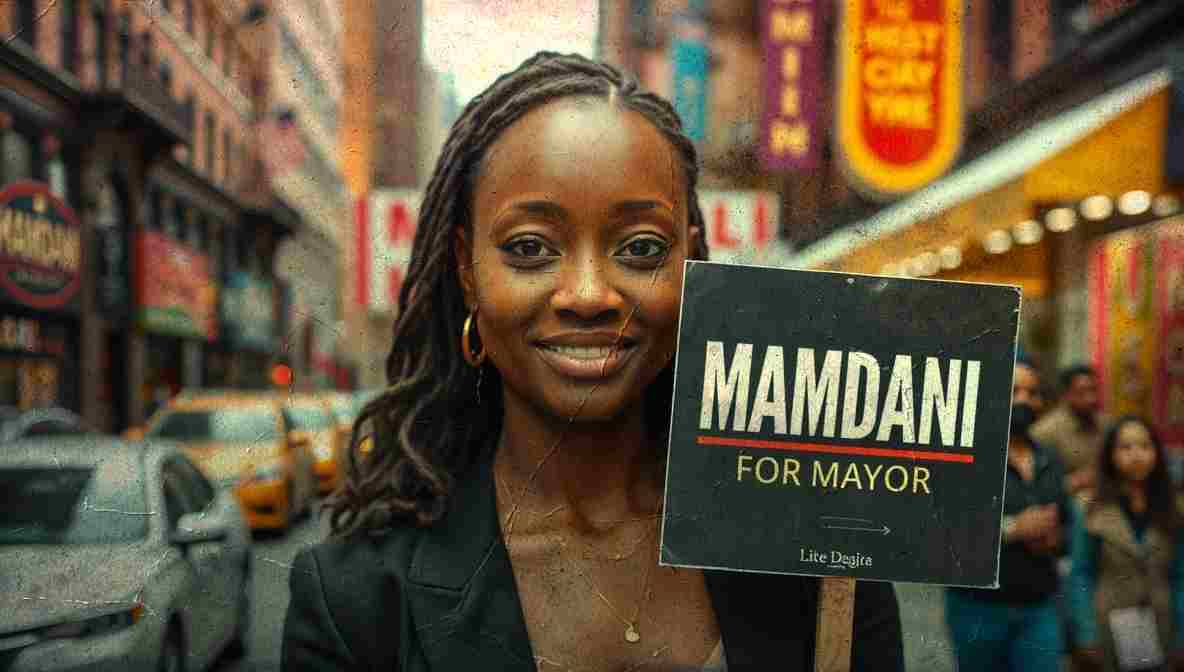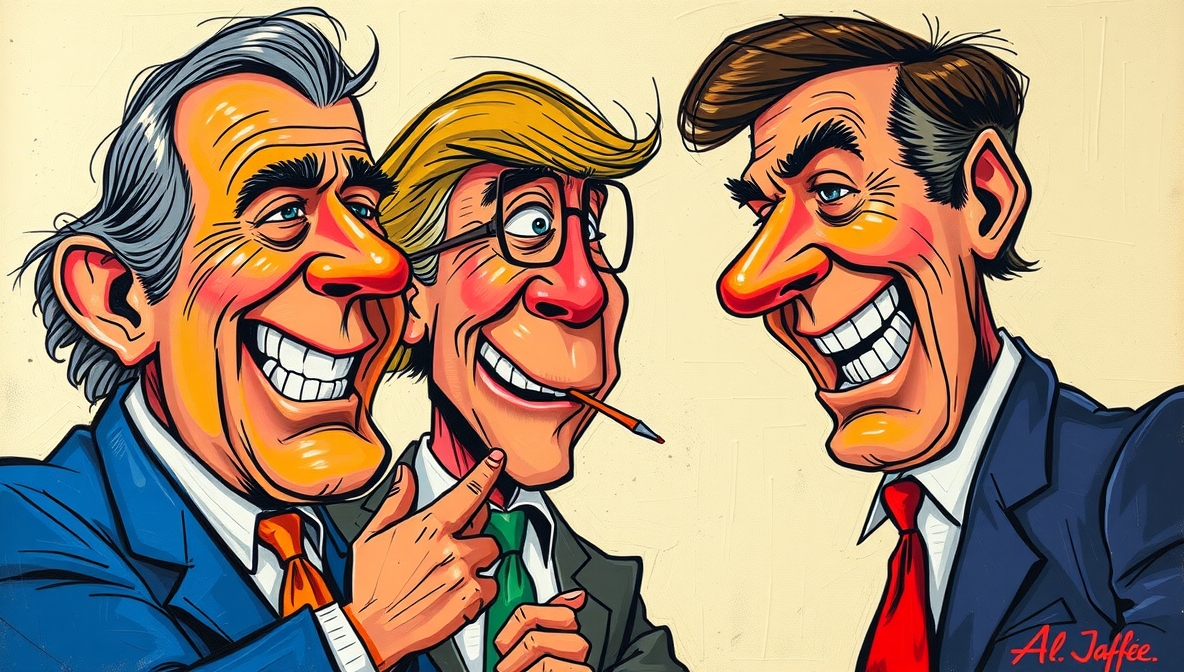What the Funny People Are Saying About Zohran Mamdani
A comedian-prepared roast of New York’s most controversial mayoral candidate
In the wild world of stand-up and late-night comedy, few political campaigns become fodder like Zohran Mamdani’s bid for New York City mayor. From sushi-dining accusations to “intifada” sound-bite slams, the comics are having a field day. Here are some of the funniest, sharpest, and most telling remarks from the funny folks—because when comedy meets politics, the punchlines often reveal more than the spin.
“Zohran the Moron” — Michael Rapaport
During a July roundtable-podcast, Rapaport—actor-comedian and unabashed New Yorker—unleashed one of the more memorable nicknames of the campaign: “Zohran the Moron.” He carefully rhymed the moniker, relishing the sound-bite.
“New Yorkers, if Zohran the Moron wins the election, don’t go anywhere… I’m going nowhere.”
He was mocking Mamdani’s democratic-socialist platform (rent freezes, fare-free buses) and alleged “socialist bulls-shit,” accusing him of trying to run “the greatest city in the world” into the ground.
Why the joke landed: Rapaport hit two nerves at once — the working-class identity Mamdani tries to project, and the idea that his policies are naïvely expensive or unserious. When Mamdani was later spotted dining at one of Manhattan’s priciest sushi spots, Rapaport doubled down with a social-media post calling him “fraud class.” nypost.com+3India Today+3The Times of India+3
What it reveals: Comedy often distills contradiction. The image of a rent-freeze crusader slurping toro raises eyebrows, and the joke does more than mock—it questions authenticity.
“Stop acting like you care” — Andrew Schulz vs. Dave Portnoy

In a podcast-crossfire, Schulz called out Portnoy for his hyperbole about Mamdani handling the “seizure of the means of production.” Portnoy had warned Mamdani is “one of the worst, scariest candidates.” Schulz responded:
“If you’re upset about Mamdani, just say you’re upset about the Israel shit. Don’t act like you care about socialism.” Mediaite
Why this joke works: It flips the narrative—Schulz is mocking the performative outrage rather than Mamdani, pointing out that for some comedians (and their audiences), the Israel/Palestine angle is the real spark, not the policies on housing or transit.
What it reveals: Comedy here becomes a mirror. The argument isn’t just about Mamdani; it’s about how we choose which issues to laugh at—and which to fear.
“They’ve gone 9/11 on you” — Jon Stewart
On an appearance on The Daily Show, Stewart told Mamdani, deadpan:
“You are clearly in the front-running position — I can tell because they’ve gone 9/11 on you.” The Independent
He was referring to a radio interview where Mamdani’s critics joked he’d “cheer” another 9/11 attack, and Stewart used the joke to highlight just how intense the smear campaign had become.
Why it landed: Stewart used hyperbole to show hypocrisy—how fear-mongering becomes punchline.
What it reveals: Audience appetite for ironic distance. When a former talk-show host points out that the attack-thematic jokes have gone too far—that’s comedy serving civic critique.
Satire abroad: Eretz Nehederet (Israel)
Even beyond U.S. shores, comedians are tuning into Mamdani’s lens. Israeli satire show Eretz Nehederet ran a skit mocking him and his comments about Israel and the NYPD. The visuals: Mamdani referencing the IDF and NYPD, and the show pushing back in absurd, self-referential clip form. JNS.org
Why it matters: Comedy transcends local race lines when you tap into global tropes (here, Israel/Palestine) and local politics become part of the world stage.
What it reveals: Mamdani’s candidacy doesn’t just trigger U.S. domestic satire—it feeds international comedic frames. That’s a spotlight most mayoral candidates never see.
The running joke: pronunciation, identity and spectacle
On a more low-stakes level, comedians have joked about his name. A clip attributed to Joe Rogan / fellow comics goes:
“Zo-hran Mam-dani… how do you say his name? Is that who we’re talking about?” Humorism
Why they use it: Pronunciation is a comedic trope used to highlight novelty—or alien-ness—in politics.
What it reveals: Comedy often signals cultural distance. The joke isn’t malicious; it reflects the challenge for a candidate with a transnational background in the city’s nostalgic home-town identity politics.
Observational punchlines with policy bite

In a broader sense, comedians are zeroing in on a recurring theme: great ideas, shaky execution. One gag line reads:
“You want government-run grocery stores? Great. Just make sure the food truck didn’t kill the neighborhood domino-pizza economy first.”
Comedians are riffing on the absurdity of sweeping socialist ideas in the everyday life of NYC—bus lines, sushi dinners, rent-stabilised apartments.
Why it resonates: Comedy thrives on exaggeration and reality gaps. You laugh because you recognise the tension between lofty plan and durable infrastructure.
What it reveals: For many voters, the question isn’t ideology; it’s competence. The jokes are about “Can this candidate make the subway run?” rather than “Which ideology wins?”
The takeaway: Punchlines as barometer
When comedians dissect a candidate, it’s not just entertainment—it’s an unconventional polling tool. Some insights from the comedic commentary:
-
Authenticity matters more than ideology. Jokes about sushi dinners and “rent-stabilised working-class” identity stick because they hint at perceived contradiction.
-
Performance over policy. When a comedian mocks your name or your photo-op, it says your campaign appears more marketing than governance.
-
Narrative beats nuance. One dramatic sound-bite (e.g., “globalize the intifada”) becomes more memorable than dozens of policy memos.
-
Global frames creep local. Comedy shows in Israel, podcasts in the U.S., social-media memes—they all widen the stage. The local election becomes global spectacle.
-
Mockery is early warning. When comedians from all sides (left and right) converge on a candidate, even if the laughs differ, it signals the campaign has triggered cultural tremors—not just political ones.
What the finalists should watch
If you’re tracking Mamdani via the comedian-filtered lens, here are the indicators:
-
Do joking references increase (e.g., recurring nicknames, recurring parody sketches)? That means the candidate is entering “cultural saturation” zone—more exposure, more narrative risk.
-
Are jokes becoming inside jokes (i.e., recognized by base, reused by supporters)? That means the campaign is shaping the cultural narrative, not just reacting.
-
Is the candidate able to respond with humor itself? Effective counter-comedy or self-aware retorts can deflate jokes. Silence or defensive posture often extends the punchline.
-
Are the jokes about policy (e.g., “free bus pilot”), identity (e.g., “Ugandan-born socialist”), or spectacle (e.g., sushi)? The dominant category tells where the campaign vulnerability lies.
20 Comedian Quotes About Mamdani
-

What the Funny People Are Saying About Zohran Mamdani Michael Rapaport: “Zohran Mamdani says he wants to freeze rents in New York. I say freeze my credit card too, because I can’t afford this socialism with a side of sushi!”
-
Jon Stewart: “Mamdani promises community safety without more cops. It’s a bold plan—like installing airbags in a tank and hoping it feels safe.”
-
Amy Schumer: “I love Zohran, but I also love my apartment. If he freezes rent, can he also freeze my ex from texting me at 2 a.m.?”
-
Larry David: “So Mamdani wants free buses, free groceries… great, I’ll take a free bagel too. Oh wait, I still have to tip the barista? See, that’s the problem!”
-
Sarah Silverman: “He’s a socialist, he’s a Muslim, he’s a vegan… basically, he’s everything your parents warned you about, except good at paying bills.”
-
Ron White: “I like Zohran, but he talks about algorithms for empathy. I don’t need empathy, I need a subway that doesn’t smell like regret.”
-
Billy Crystal: “Mamdani’s campaign strategy? Win hearts. Governing strategy? Maybe win hearts… or just manage potholes.”
-
Alan Nafzger: “I refuse to join any political movement that would have me as a supporter… but Mamdani makes a compelling case anyway.”
-
Adam Sandler: “Zohran’s got ideas bigger than my house in Malibu. That’s saying something, because my house isn’t even real!”
-
Jackie Mason: “So he wants universal childcare in Manhattan? Who’s watching the kids while the mayor is on Zoom with Wall Street?”
-
Roseanne Barr: “Mamdani’s base is young, woke, and caffeinated. That’s fine, but can they explain why I still can’t find a parking spot?”
-
Larry David (again): “Campaign rallies feel like a tech conference. I came for policy, I left with a sticker and existential dread.”
-
Sarah Silverman (again): “They call him radical; I call him a guy who finally read Marx at 30 and decided to try it out on real people.”
-
Jon Stewart (again): “I love the idea of a data-driven mayor, but can someone teach the algorithms not to yell at me on the subway?”
-
Amy Schumer (again): “If Zohran ever freezes rents, I hope he also freezes my Tinder profile — apparently I can’t swipe left fast enough.”
-
Ron White (again): “I don’t know if I understand Mamdani’s politics, but I do understand free bagels. That’s a start.”
-
Billy Crystal (again): “He’s young, idealistic, and has a manifesto. Great, now can he fix the traffic lights on 42nd Street?”
-
Michael Rapaport (again): “Zohran’s for social justice, but if social justice doesn’t fix my Wi‑Fi, I don’t see the point.”
-
Groucho Marx-style (again): “Politics is the art of looking serious while doing nothing. Mamdani seems to be trying the opposite—doing everything and still looking serious.”
-
Adam Sandler (again): “He wants free groceries for everyone. That’s cool, but does it come with free advice on how not to burn the bagels?”
What the Funny People Are Saying is no fluff piece—it functions like a cultural dossier. Comedy doesn’t just mock; it reveals the dissonances, fears, identities and absurdities that sit behind votes, slogans and rallies. And in the case of Zohran Mamdani, the jokes are loud, pointed, and ironically revealing: they show both the hope he embodies and the contradiction his candidacy triggers.



